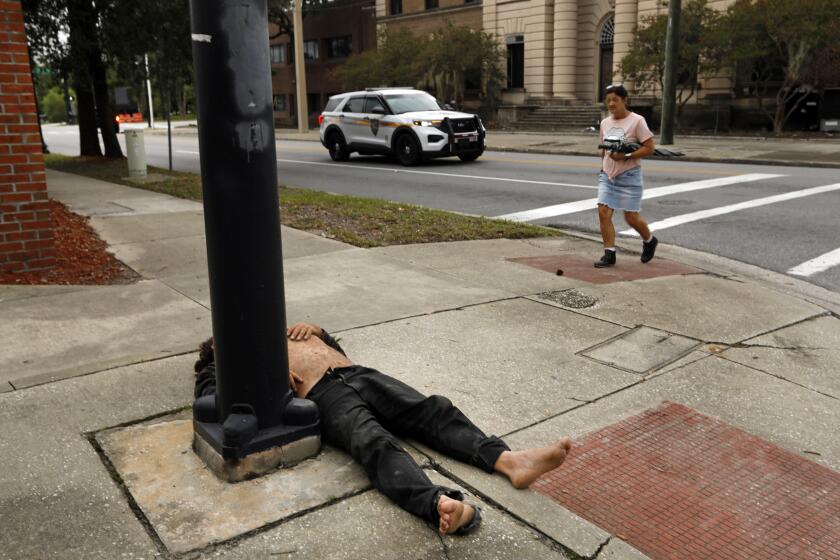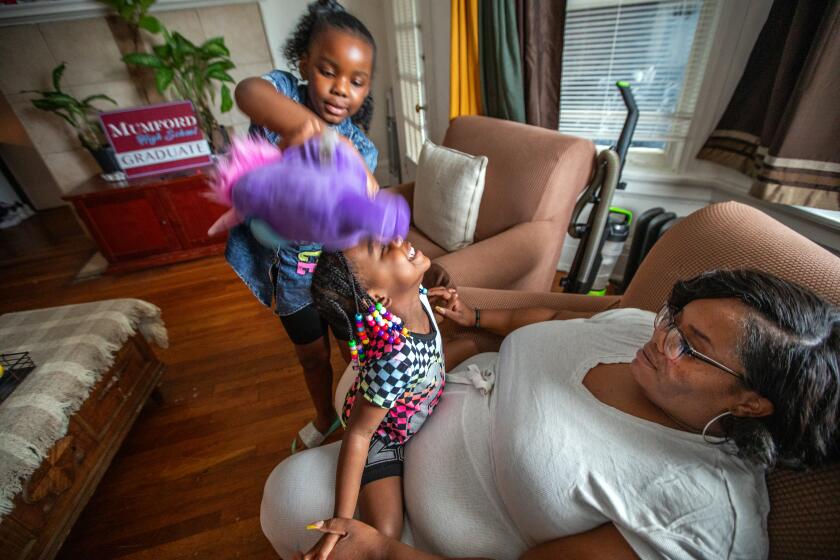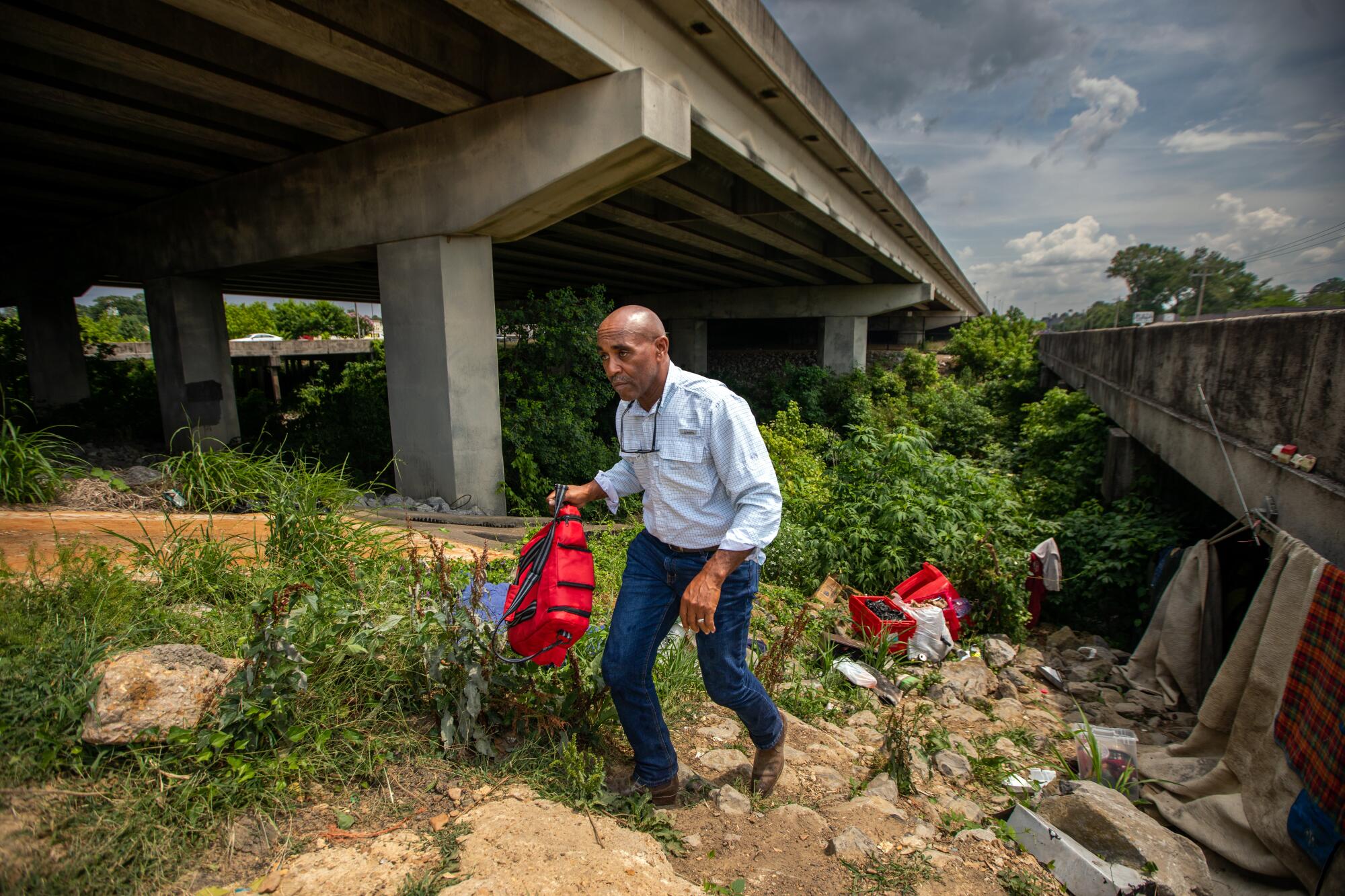
- Share via
JACKSON, Miss. — Tommie Brown, a homeless outreach coordinator here in the capital of one of the country’s poorest states, saw a lifetime’s worth of desperate people as he navigated bumpy roads in his green Toyota Tundra on a recent morning, including a woman who said her landlord stole her benefits check and then broke her arm by clubbing her with her own walker.
Yet he knew homelessness was an even more serious problem elsewhere. He’s been to Los Angeles, twice, to learn about the city’s homeless population.
“I can’t imagine L.A. being in a situation or position to be proactive anymore,” said Brown, 62, who made weeklong visits to Los Angeles in 2010 and 2016. All L.A. can do is “try to keep up with the situation,” he added.
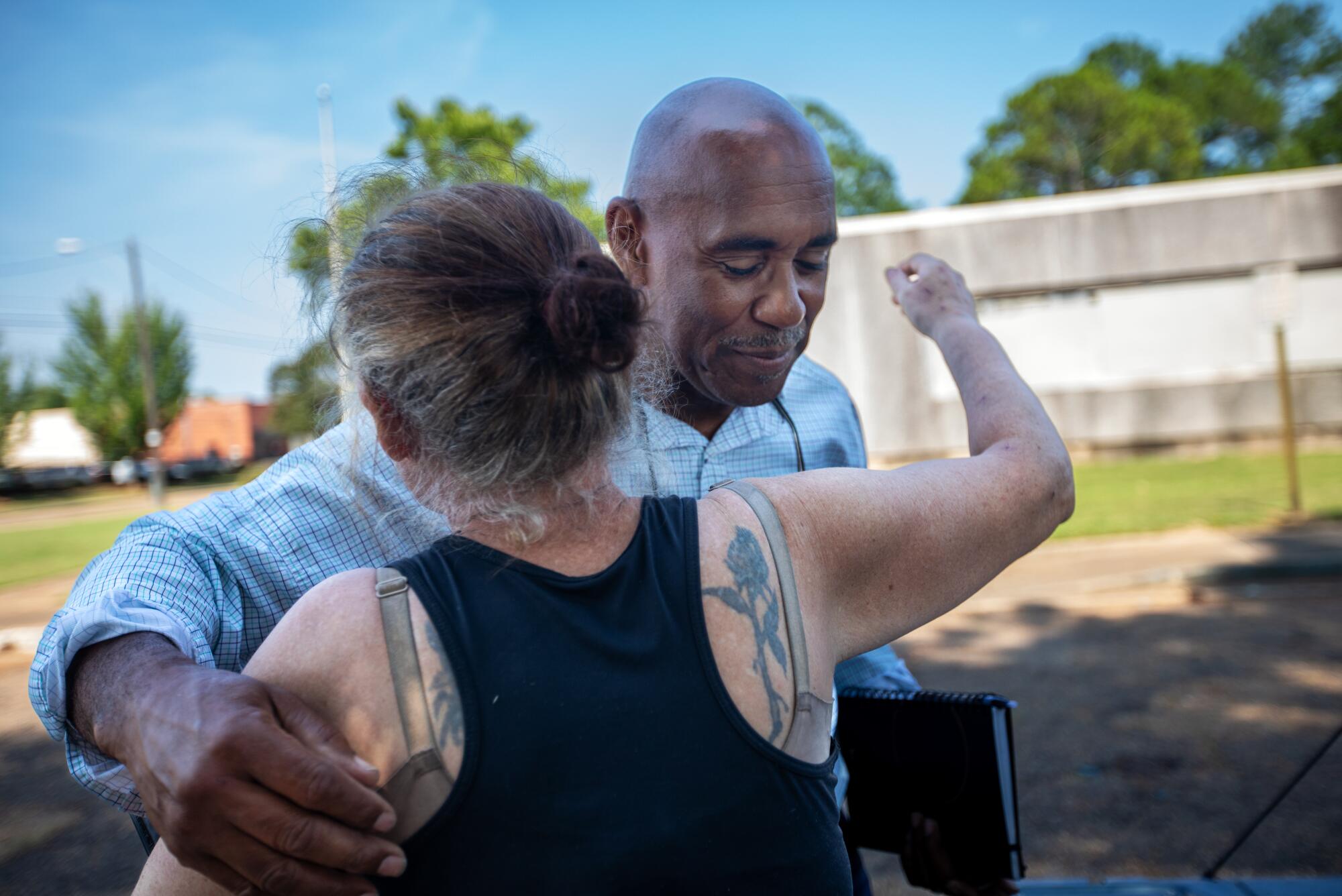
Mississippi has plenty of problems, starting with the nation’s second-highest poverty rate, just behind Louisiana’s. Yet the state also has the country’s lowest homeless rate, a combination of statistics that is hard to fathom for those who believe poverty directly leads to homelessness.
Jackson’s ability to contain its homeless problem shows the power of cheap housing to keep people off the streets, according to experts and people who work directly with Jackson’s homeless population.
It’s hardly perfect. Jackson has the country’s highest murder rate. And many people are afraid to drink the water, a reflection of crumbling infrastructure resulting from decades of institutional racism and neglect. Drug overdose deaths occur here at roughly the same rate as in California, and some advocates believe addiction is behind a recent uptick in youth homelessness here.
Jacksonville, Fla., has a good track record for moving homeless people off the streets. But as the city continues to grow, local builders and advocates worry about creating another housing crisis like the one in Los Angeles.
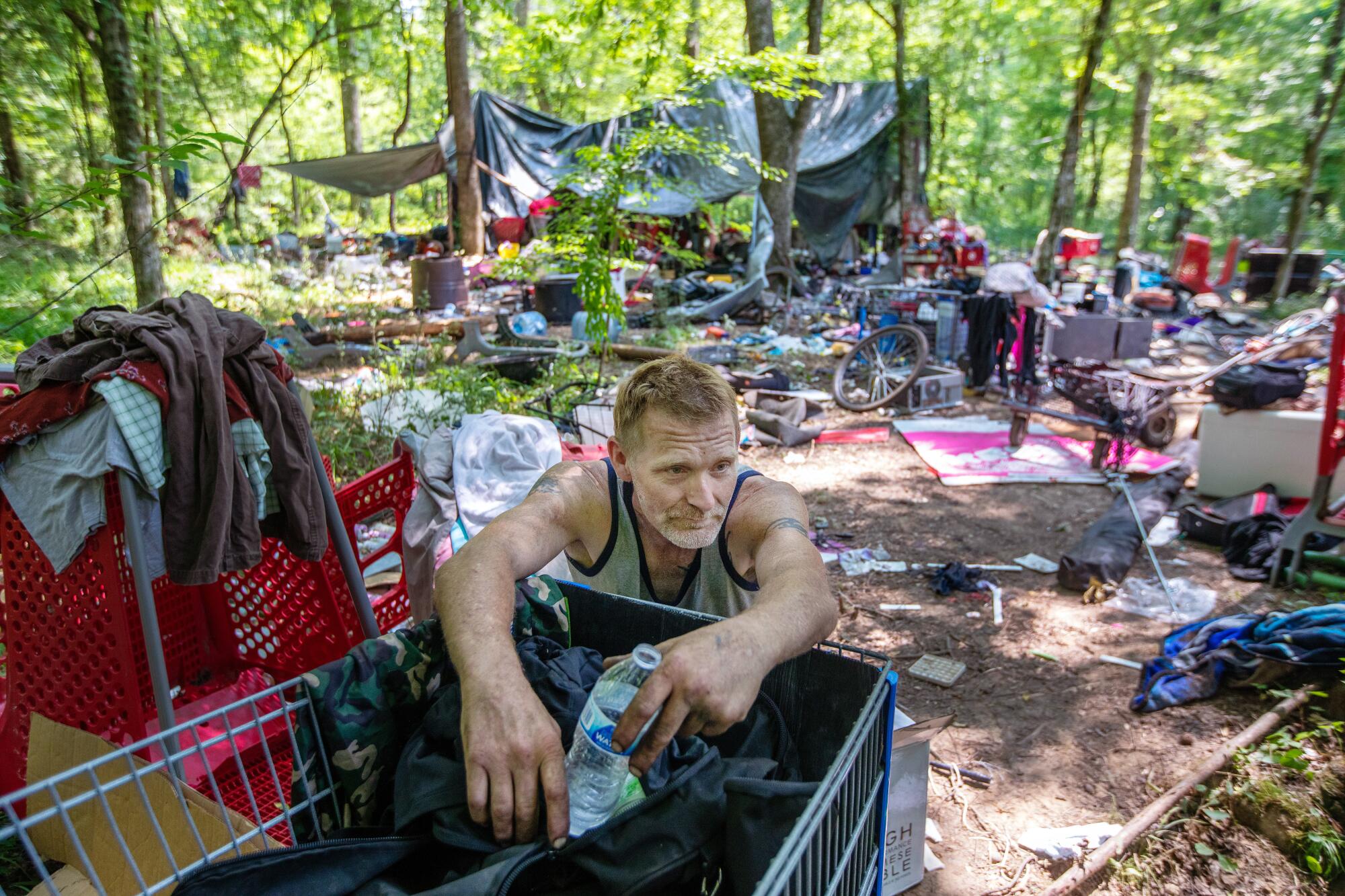
Still, the city of Jackson has an opportunity to limit street homelessness, Brown said. His organization is training more outreach workers; the city is seeking grant money to expand services. Brown believes if businesses, churches and others took responsibility for even a single person, they could find lasting shelter for most of the city’s population.
About 500 people are living on the streets in Greater Jackson, a five-county area of more than 500,000 people, according to the annual homeless census. Such counts, which happen around the country, are routinely criticized as flawed and artificially low. But the comparison with Los Angeles County, with more than 55,000 people estimated to be living on the streets and outside of shelters, is nonetheless jarring.
Los Angeles County has about six times more homeless people living on the street per capita than Jackson’s five-county service area, according to local estimates and census data.
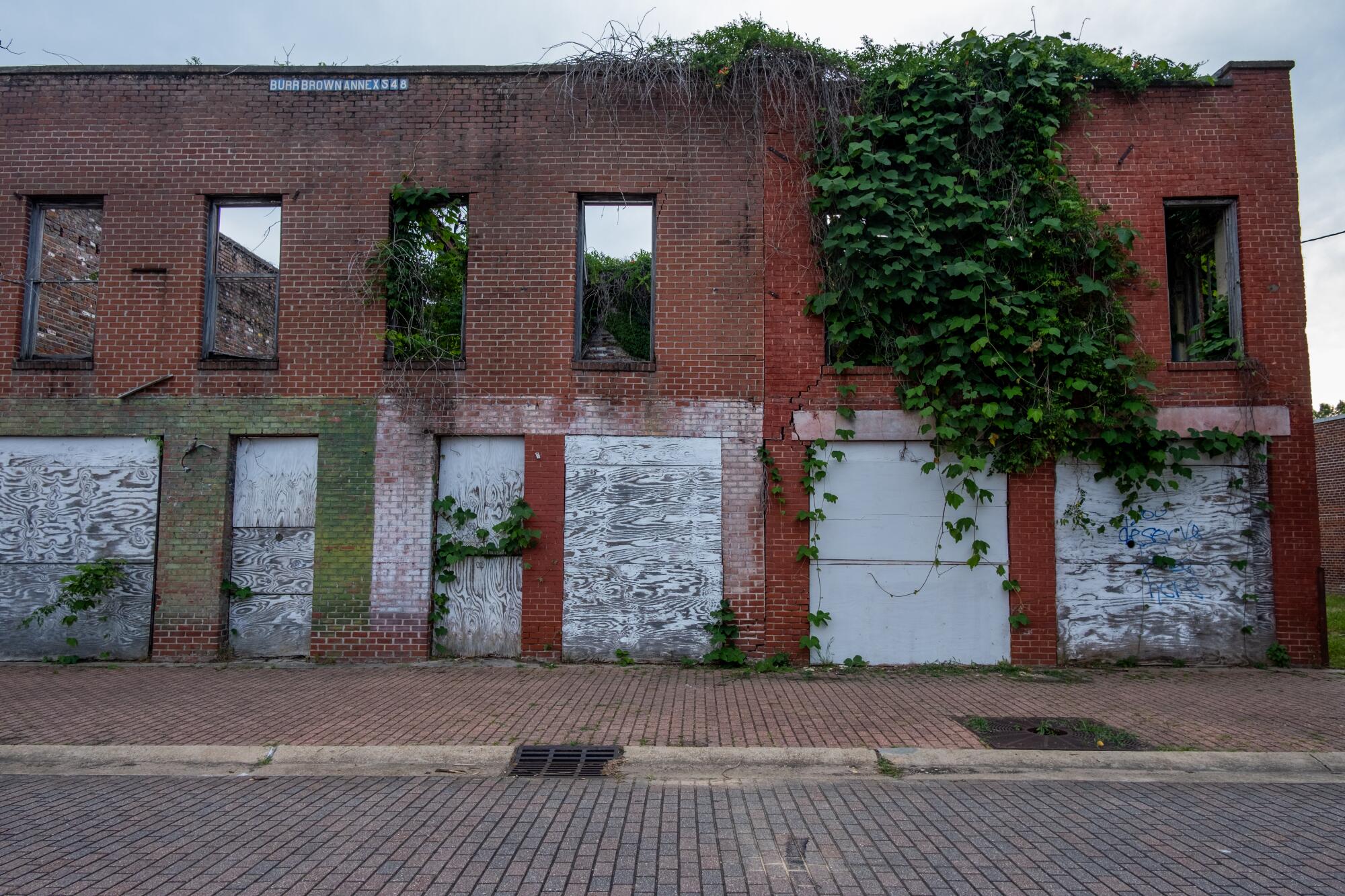
Many buildings here are abandoned, allowing for squatters, while those who stay outside are unlikely to face frequent winter freezes. Visitors can easily spot unhoused people here along the highway or find them getting free meals at churches just a few steps from the neo-Roman state Capitol building.
Experts say the low cost of housing plays a role in keeping their numbers down. People here can find a dwelling for $650 a month, though the quality of the apartment is likely to be poor at that price. Rooming houses, which can cost even less, are often exploitative.
A typical apartment here rents for about $800, according to Zillow, compared with about $2,200 in Los Angeles.
Brown, an ordained minister, spent two decades as a police officer before retiring in 2007. One of his first assignments, during a stint on the SWAT team in the early 1990s, was clearing a homeless encampment because of complaints from a nearby subdivision. The effort felt futile even at the time, he said. Now, he spends weeks or months gaining people’s trust.
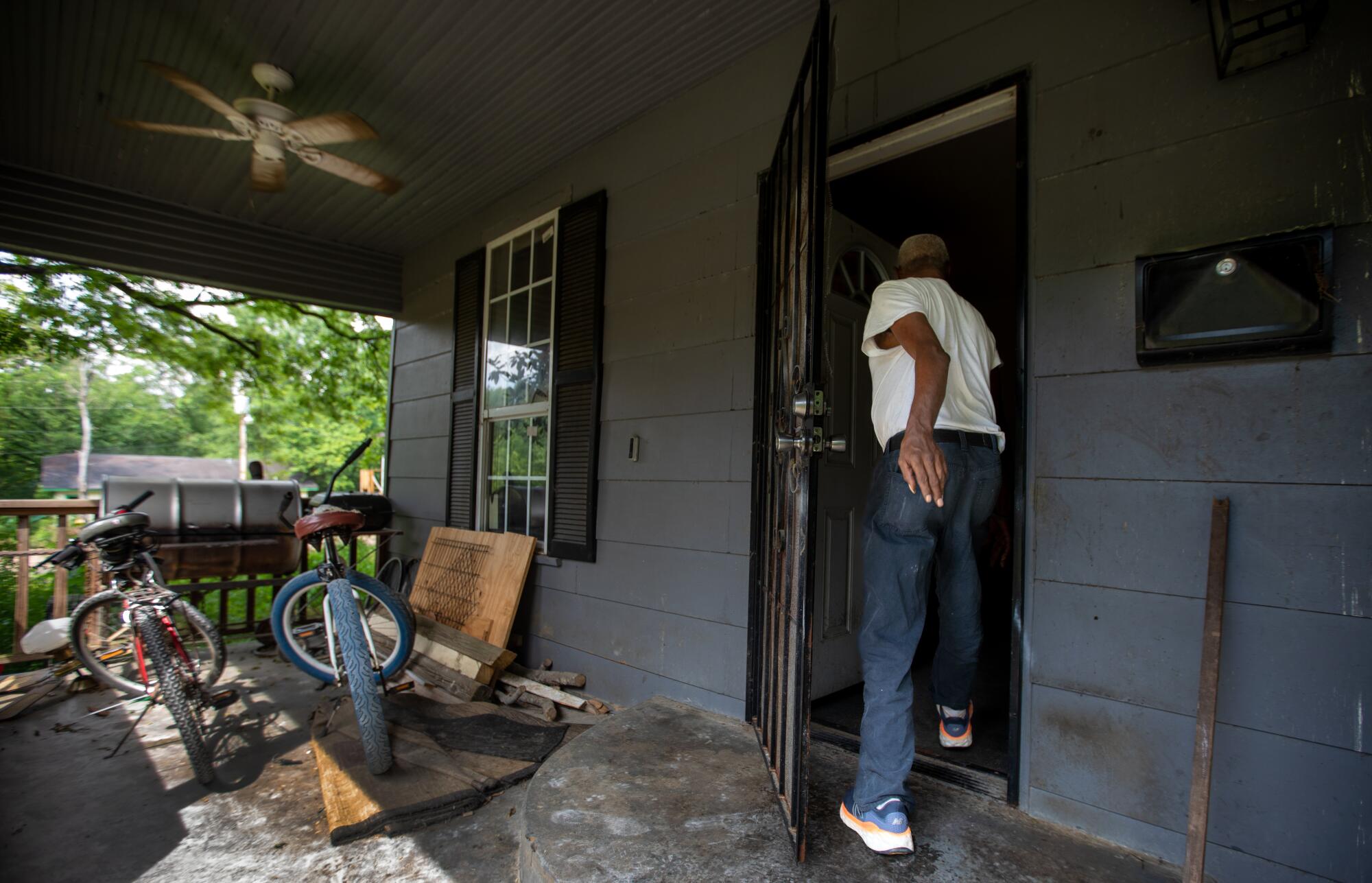

During free breakfast at Galloway United Methodist Church, Brown pointed out Wilbert McGee, who had a tray of mashed potatoes, gravy, Salisbury steak, pinto beans and an orange. A few years ago, McGee, 62, was staying in a lawn mower shed after his release from prison, using a bucket to bathe himself and wash his clothes.
A man McGee grew up with who was like a brother invited him to stay over, he said. After four years, the man offered to sell him the house across the street — for $10,000, whenever he could pay.
The public tends to blame homelessness on poverty, drug use, crime or warm weather. But other cities don’t have L.A. levels of homelessness. They have more housing.
McGee said he spent a year as a sheetrock finisher to pay off the deed. Charities paid $4,000 in back taxes and bought him a television set.
The small gray house needs work. Take a wrong step and you might fall through the rotting particle-board floor in the main room. It smells of mildew. The walls, which had gaps from missing drywall, were moldy. McGee was trying to find a program that can finance repairs, including the broken motor on his air conditioner.
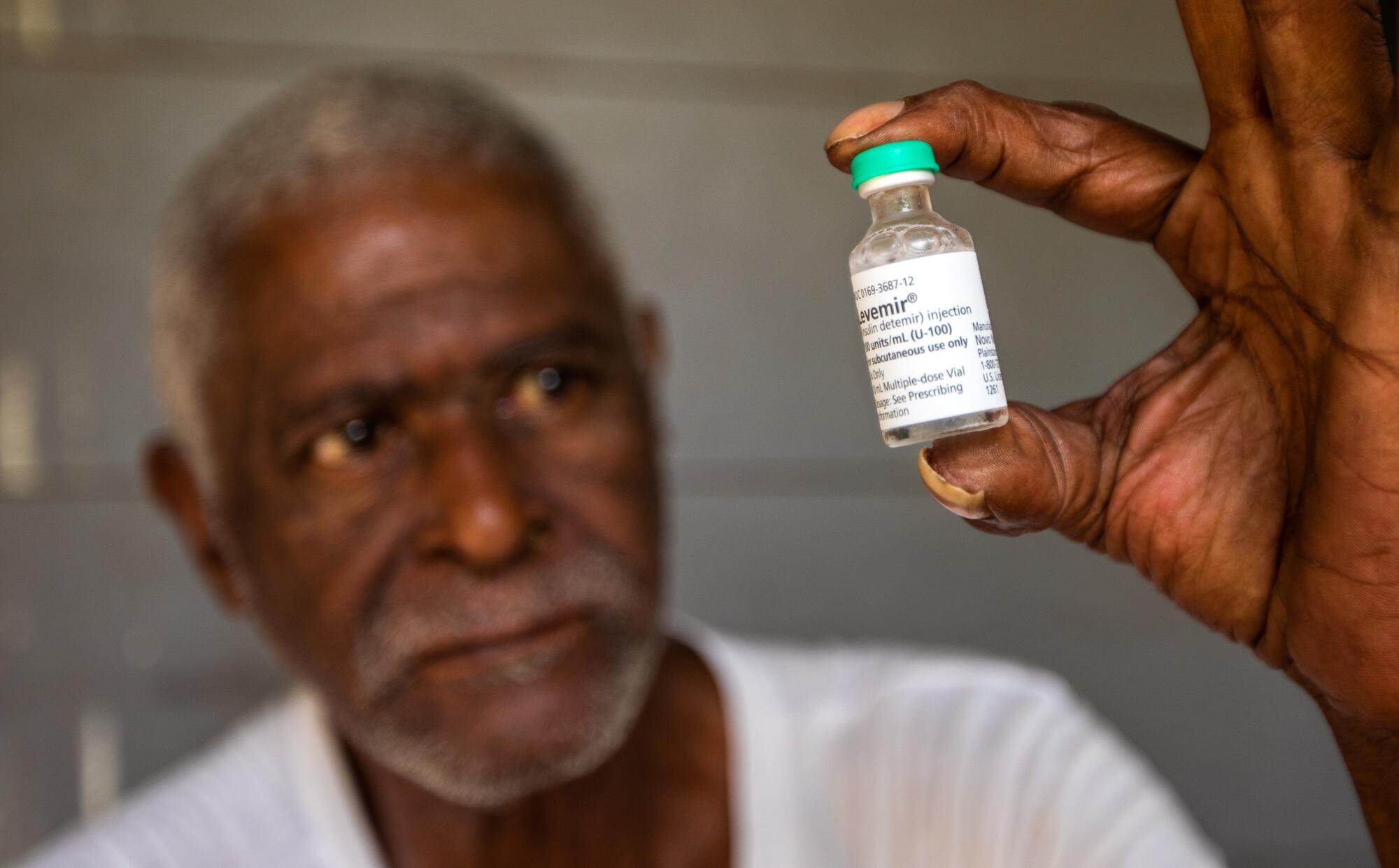
McGee didn’t have money for dinner the night he allowed The Times to visit him; he was considering eating peanut butter from a jar because he had no bread. His dog Blackie was nursing new puppies, but McGee could not afford to treat the cancerous tumor that was bulging beside her teats. He had about half the monthly insulin he needed for his diabetes and no inhaler to treat his asthma. Sitting on his front porch under a magnolia tree, he said he felt grateful as he recounted his life, including a childhood picking cotton for his grandparents while living in a house without indoor plumbing and electricity.
“I mean, my life is a blessing. I ain’t going to say it’s the best,” he said. “From where I’ve been and where I’m going, I wouldn’t add nothing.”
Though Jackson’s official homeless numbers are relatively low, they have gone up since the end of national COVID-19 emergency measures that provided money for anti-poverty programs and prevented evictions. Many advocates believe the numbers are much higher.
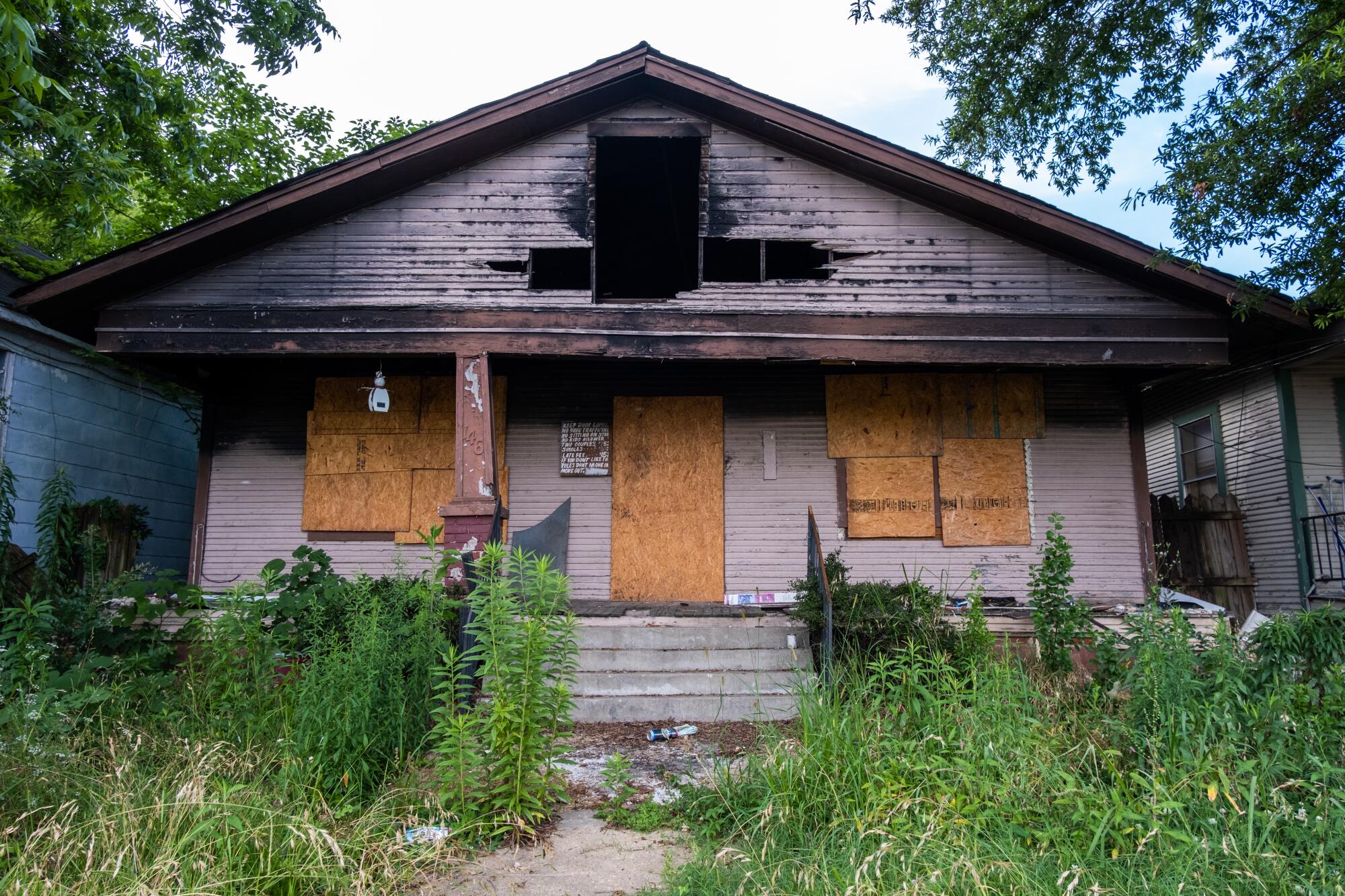
The city’s mayor has targeted homelessness, and his administration is urging broader public acceptance of more manufactured housing. The city planner who heads the effort, Chloe Dotson, said she is working on a $6-million plan to buy a former school and turn it into a center that can work with nonprofits to give housing and services to 130 families and individuals.
Jackson cannot look at homelessness in isolation, she said. Decades-long problems, including a dark history of racial oppression, environmental discrimination and discriminatory zoning practices, have left many more people living in poverty, she said.
“We can’t just focus on homelessness,” Dotson said. “We also have to try to prevent it.”
At another downtown church breakfast, Brown spotted a woman who has helped keep people off the streets, Esther Ruth McGrigg.
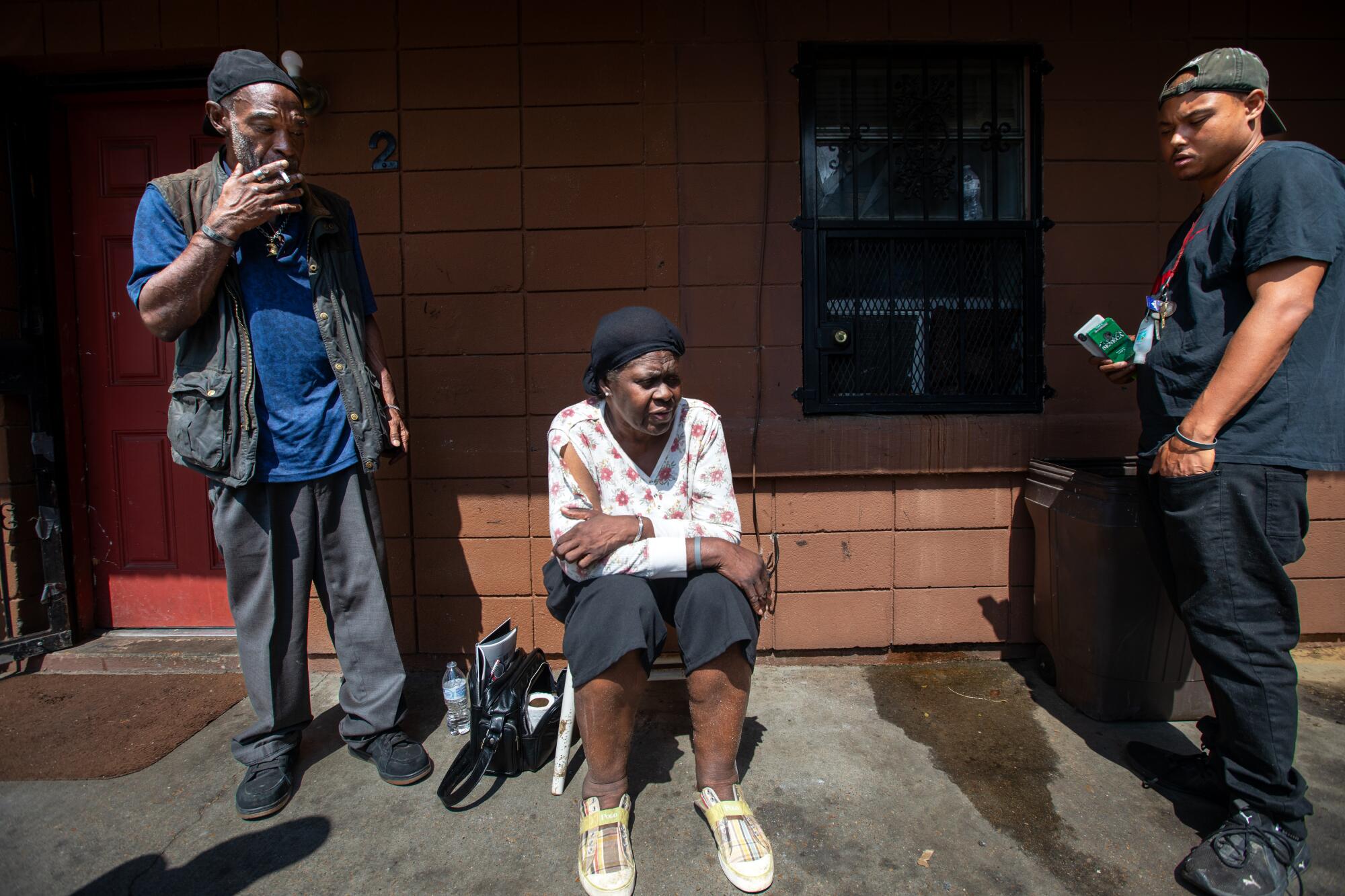
A Mississippi native, she moved back from Texas last year in hopes of getting a kidney transplant from her brother, who was getting out of prison. McGrigg, a 63-year-old former biology teacher who relies on disability payments, nearly became homeless herself when she arrived back in Jackson. But a church paid a motel to house her and her brother for three or four weeks and then a deposit on a $650 apartment lease.
First she let her brother move in. Then her daughter ran into one of her old students living in a post office. She took him in too.
The brother is back on the streets, but McGrigg’s old student and two other men were still staying in her small apartment. One man slept in the living room.
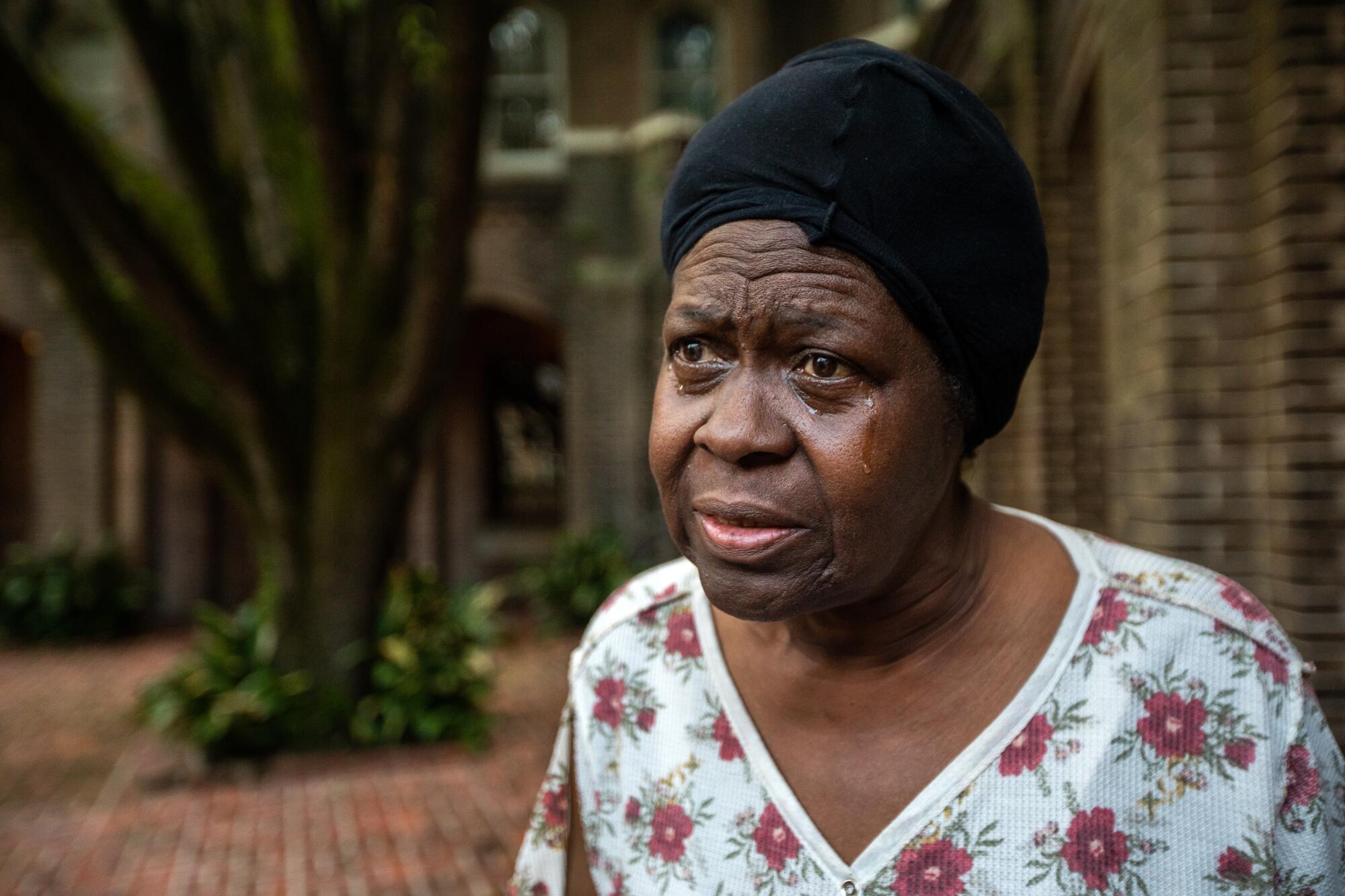
Her phone service was cut off the day The Times visited, and she was about to have the power cut off too unless she could get another extension on the $221.56 that was past due.
The problems stacked up mercilessly: an added $100 on the rent when the landlord found out she was taking people in; a car navigating potholed streets with a spare tire; a man who showed up acting erratically and asking if he could play her romantic music and sleep over.
She had picked up free church breakfast for friends but had not eaten herself. She cried often but believed things would fall into place.
Days earlier at Walmart, she heard someone say they had no room for 40 pounds of chicken.
“I have room,” she said.
Data and graphics journalist Sandhya Kambhampati contributed to this report.
- Share via
Watch L.A. Times Today at 7 p.m. on Spectrum News 1 on Channel 1 or live stream on the Spectrum News App. Palos Verdes Peninsula and Orange County viewers can watch on Cox Systems on channel 99.
More to Read
Sign up for This Evening's Big Stories
Catch up on the day with the 7 biggest L.A. Times stories in your inbox every weekday evening.
You may occasionally receive promotional content from the Los Angeles Times.

